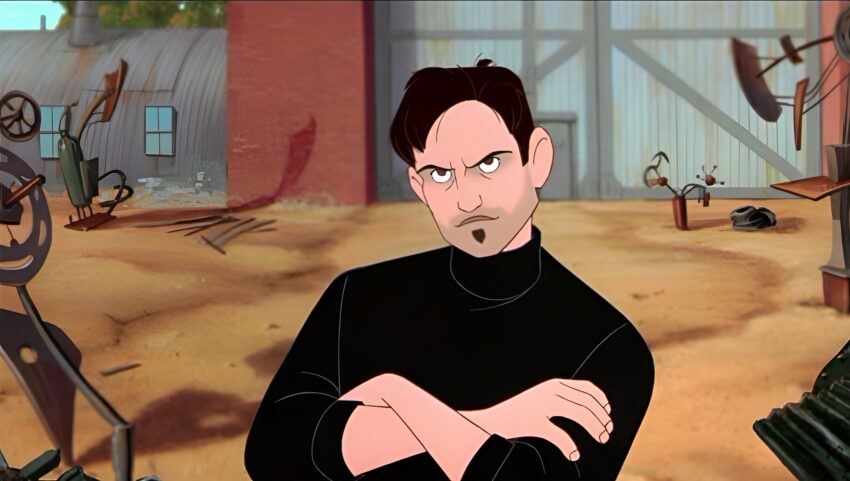We’ve all encountered minor characters that don’t really have a purpose. It seems like the writer decided their protagonist needed a friend, so they wrote one in who gets plenty of lines, a few scenes, and one or two characteristics that quickly lose interest and depth. These characters feel like a cardboard cutout of an interesting personality without any real dimension.
We’ve talked about the impact that well-defined, perspective-shifting side characters can have on your story. But as authors, we don’t always have time, energy, or the ability to write each character as a fully-fleshed-out mini protagonist of their own story… as much as we might want to. Sometimes it wouldn’t fit the story and would end up detracting from the main character’s journey. Other times, the story’s theme is best served by looking through the perspective of only one character. But sometimes all the other elements within the story are simply so demanding that we don’t have time to define each character.
Whatever the reason, eventually every writer hits a character that they can’t flesh out as much as their protagonist.
So… what do we do with those characters?
The answer is to write them like Dean from the classic movie The Iron Giant.
The Iron Giant
Dean is an artist and metalworker who lives next to a scrap yard full of metal he uses for his art projects. One day at his small town’s local diner, he ends up accidentally befriending his waitress’s nine-year-old son, Hogarth, in search of his lost pet squirrel.
Hogarth is a lonely latchkey kid being raised by a widow, and he’s desperate to find a friend of any kind — even if it’s a pet squirrel or an eccentric adult. When he discovers a 50-foot-robot that’s crash-landed from outer space, of course his first instinct is to befriend it.
But the robot needs a place to stay, as well as metal to eat. He’s also trying to avoid the prying eyes of Kent Mansley, the government agent sent to investigate strange reports from the town. With nowhere else to go and no one who he can trust, Hogarth finally brings the giant to Dean, who, to his relief and amazement, agrees to keep the robot at his scrap metal yard, as long as the Giant helps him with metalwork projects, setting the stage for an unlikely friendship between them.
Dean
The Iron Giant is, without a doubt, a protagonist-centered story. Sure, we get a well-rounded villain and a hint of romance for Hogarth’s mom, but other than that, the characters around Hogarth are very much in the background. They are interesting and their actions and personalities make sense, but they aren’t so fleshed-out that they distract from the main plotline. Instead, Hogarth and the Giant share the spotlight together, because it’s ultimately their story.
Dean in particular is an awesome case study of this. He takes actions that affect the plot, participates in interesting dialogue, and is even the first character to say the movie’s theme out loud. His personality is well-defined and compelling, but at the same time, he never feels like the protagonist of the story. There isn’t a moment that makes it seem like the movie would be more entertaining with him as the main character, either. The audience isn’t left desperately wanting more from him, feeling like his arc or personality hasn’t resolved, and yet at the same time he comes across as well-rounded and thought out, even as a minor character.
Walking the tightrope between writing a character that’s too flat to belong in the story or too interesting to be minor (thus intruding on your protagonist’s spotlight) is extremely difficult. And yet Dean does that effortlessly.
The key to writing characters like this is giving them a progression, even if it’s a subtle one. Don’t let them exit the story the same way they entered it, even if it’s only the reader’s perception of the character that’s changed. And that’s an important point, because often giving characters like Dean a full-blown character arc or romantic subplot will shift the focus of your book, throwing it off balance. When that’s the case, rather than changing the character themselves, instead change your reader’s understanding of that character. Or, at the very least, allow them to gradually discover more about that character as the story goes on.
When we first meet Dean, he overhears an old drunk at the diner telling a group of patrons that he’s seen a giant metal man. As the man is mocked and laughed at, Dean eventually steps in to defend him, and the result is that he’s mocked, himself. This event doesn’t seem all that important, and even Dean brushes it off. Plus, it’s over in less than a minute. But it shows something important about Dean’s character. He defended someone who most people would deem a waste of time and energy. He didn’t expect to be paid back or have kindness returned for his actions, and in fact he received mockery instead. Instead, he defended the drunk because he thought it was the right thing to do. It took courage (albeit just a little), and that shred of information about his character matters.
The next time we see Dean, he meets the Iron Giant for the first time and, despite the risks, inconvenience, and insanity of the entire situation, agrees to help Hogarth hide him. Yet again, he displays courage in taking on a risk to help someone few people would give the time of day. There’s nothing he can expect to gain from helping a nine-year-old, plus at first he’s terrified of the fifty-foot metal “monster.” But courage is not fearlessness, but the actions taken in spite of it, and Dean demonstrates this again by agreeing to hide the Giant.
If you’ve seen the movie, you know where this is going. Dean goes from defending a man in a cafe and hiding a robot in his backyard to telling bold-faced lies to a government agent backed by dozens of armed soldiers and several tanks. He makes the Iron Giant seem like yet another one of his scrap-metal art creations, protecting both the giant and Hogarth from the government.
But the greatest demonstration of his courage comes later, when the military’s weapons have triggered an involuntary self-defense mechanism within the Iron Giant and sparked a conflict that threatens to flatten Hogarth’s entire town. As the battle rages on and the Giant seems indestructible, nuclear weapons are considered as a last resort to end the fight, even at the cost of the entire town. Hogarth realizes the only way to save everyone will be to reach the Giant personally, and so he races after him in an attempt to convince him to stop.
In the midst of all of this, Dean charges into the battle and tries to explain to the general that the defense mechanism is automatic and will immediately stop once their weapons are lowered. With his message delivered, he takes off again to find Hogarth and try to protect him from both the Iron Giant and the military — unarmed, unprepared, with nothing but a motorcycle.
His progression as a character has come a long way from where it began. Over the course of the movie, he’s gone from defending a drunk to facing a battle where he’ll almost certainly be killed. It was so subtle it was hardly noticeable, and yet that progression is what makes him such a good minor character. He is interesting and had depth as a character because each scene added a new layer to our understanding of his courage. And he didn’t take over the spotlight because he wasn’t given a deep past, complicated motivations, or crucial desires that had to be satisfied by the end of the story. In fact, his progression is so subtle that you really don’t notice it almost at all.
I couldn’t tell you what Dean’s desire and fear are. I have no clue what his friends and family are like, how he grew up, or who he is as a person aside from the interesting but ultimately surface-level personality that the writers gave him. But he has a depth that makes him fundamental to the story because he represents one of its core values.
If you want to write a character like Dean, who has depth without being distracting and displays a progression without needing a full arc, take a value or virtue that forms an integral part of your overall theme and give it to a minor character. It could be anything, from kindness, justice, mercy, or patience. Introduce this character with a small picture of how central the value is to their lives. Then, with each consecutive scene or interaction, increase that picture until by the end, that character has become one of the most kind, just, merciful, or patient one of your entire cast.
And this technique also works for minor characters that represent negative values or even a different sort of progression altogether. For example, the villain, Kent Mansley, gradually grew more and more evil and desperate. Although he begins the movie as a bored but ambitious government agent, by the end of the story he’s willing to kill himself and the entire town to stop the Giant, even after the battle is over. Hogarth’s mother, Annie, on the other hand, progressively grows more interested in Dean, until by the end the two are together.
Each of these characters were minor, had little depth, and yet still held significance and impact because they gradually revealed the true extent of a certain quality — whether it be courage, desperation, or romance — throughout the story. And that progression is what makes minor characters like this compelling. By intentionally withholding critical information about each of these characters, the writers were able to use curiosity to drive the interest around each of them. None of them took away from Hogarth’s journey, but they were interesting because of the hint of mystery surrounding each. Was Dean’s courage really as crucial as he says it is? How far is Kent willing to take his obsession with the Iron Giant? Will Annie remarry, completing their family and giving Hogarth a permanent father figure?
Despite the fact that they aren’t well-rounded, fully developed, or capable of carrying an entire movie as their protagonist, each of these characters are critical to Hogarth’s story, but especially Dean. His impact on the protagonist (and thus the story as a whole) is hard to notice at first, but by the end it become unmistakable. In his first scene, we see Hogarth waffle between defending a drunk and being laughed at or sitting back while someone else is mocked, and it’s Dean’s actions that show him how valuable courage is. It’s Dean’s declaration, “You are who you choose to be,” that is ringing in Hogarth’s ears as he tears through a battle ground to reach the Giant and beg him to stop the attack. Throughout the climax, Hogarth displays an almost unbelievable amount of courage for his age, and it’s because of Dean’s example in his life.
Just because your character is minor doesn’t mean he can’t impact your protagonist, plot, and theme in massive ways. Just because you don’t have the ability to give him a complex backstory, motivations, and even many of the fundamental aspects of a well-rounded character doesn’t mean he has to be boring.
Dean is not the story’s protagonist. Far from it. Many would consider him a minor character. And while it’s true that most of the story’s plot points could happen without him, he is truly an indispensable part of the movie’s theme, depth, and the character arc of its protagonist.



Let us know in the comments:
What minor characters have been your favorite? What progression did they go through in their own story?


Hi! My name is Mara, and I’m a Christian artist, violinist, and blogger. I remember the day that I decided that I would learn something new about what makes a good story from every book I picked up — whether it was good, bad, or a mixture of both. I use this blog as a way of sharing some of the tips and tricks I’ve learned, and highlight which books, cartoons, and movies have taught me the most about writing an awesome story.


Those are the kind of characters that you skip around to read about. The kind that, when you make a video edit of them, it’s only a few minutes long and it’s one of the most popular.
Also, why is this dude’s name to close to mine? And he’s played by HARRY CONNICK JR.??? Did he sing at all? He’s got an amazing voice!
No, he doesn’t sing, unfortunately. I didn’t know he sang though, that’s really cool!
My only issue with minor characters is that in the kind of book I’m writing, they have a very bad habit of dying. Otherwise they make for interesting characters. But where do you draw the line between a minor character and a side character?
Yeah…… Characters have a tendency to do that…. I think the problem with mine is that they DON’T die.
I think the difference is this: If I edit this individual character out of existence, will my story have a hole in it?
This question is one of those that I’ve seen a lot of authors disagree on. There isn’t a specific consensus, so I’ll just give my take on it.
Personally, I see side characters as those that you could write a whole book from their perspective without having to add more to their character (good examples would include Sokka from ATLA, Violet from the Incredibles, and Katherine Plumber from Newsies.) All of these would need a plot and specific conflict for a story centered around them to be interesting, but we already know their backstory, internal conflict, and flaws — those wouldn’t need to be added.
Minor characters would need a lot more work before you could write a whole book from their perspective. I think Dean is such a good example of this because even though he’s interesting and crucial to the story, we know very few facts about him. We don’t know his backstory, internal conflict, or flaws, just his occupation, personality, and values. (Other good examples of minor characters would include the team from Big Hero 6, Peni Parker from Into the Spider-Verse, and the cabbage merchant from ATLA.)
Not all writers will agree with this, but I think it just helps me classify my characters and figure out how much work they actually need to fill their particular role in the story. For example, if I would feel confident writing flash fiction or even a whole conflict around one of my characters, they’re probably developed well enough to be a side character, rather than a minor one. And while there are characters that fall somewhere in the middle (like Suki and Jet from ATLA), the majority don’t, which makes figuring out which is which simpler.
Wow, that was a lot more words than I was expecting. I could probably write a whole blog post on this. Would an article be helpful to you guys?
The most helpful thing would be when to write which. When do you write a minor, and when do you write a side character?
Okay, that’s definitely a whole article. I’ll keep the idea in mind and it’ll show up on the blog if I can find a good case study for it!